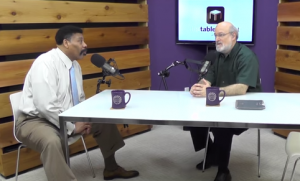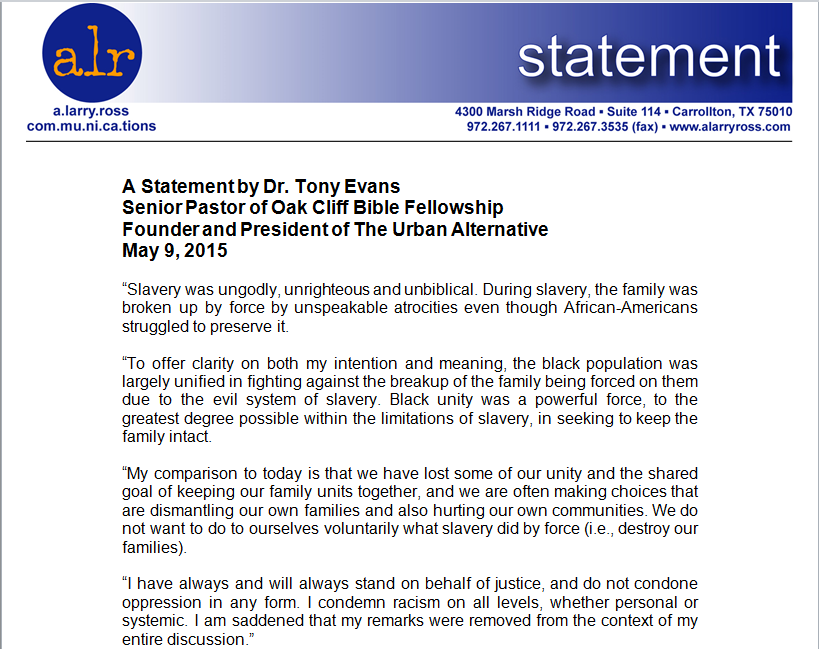
Tony Evans raised eyebrows several weeks ago when he said the African-American family was “a lot stronger” during slavery than now. He later issued a statement saying “slavery was “ungodly, unrighteous, and unbiblical.” However, he maintained that Black families today have “lost some of our unity” in contrast to Black unity during slavery. While we disagree about the stronger slave family, I appreciated Evans’ efforts to address his earlier remarks.
Evans had other things to say in that Dallas Theological Seminary interview. Although I appreciated the fact that the conversation was happening at all, I have to take issue with something else that Evans taught in the interview. Talking about African-Americans adapting to “the White world,” Evans said:
It’s not an equitable adaption because it’s not the same situation. And so that’s just a reality. Now you can fight about it but that’s the way it is. And since that’s the way it is we need to learn spiritual truth that enables us to do that and not fight against that reality. That becomes a growth opportunity for both sides.
With this quote and in the rest of this segment, Evans provided a pretty good description of White privilege. Begin watching at 14:16 into the video:
[youtube]https://youtu.be/KyBrnK_c1O0?t=14m15s[/youtube]
Transcript (from Dallas Theological Seminary’s page):
Dr. Evans: Well you do have to fight against it because you are – and a lot of times swimming upstream against background history, what your mother and daddy taught you, what your experiences have been, if you had negative experiences with a minority and you’re Anglo, that’s gonna color that. You know so and we also have to understand there’s a real reality here and that is African-Americans have to function in a White world. You know, your work is going to typically be in that world and you have to, you don’t have a choice. You have to do business in that world.
So but the Anglo world rarely has to function in an African-American context. It does it because it chooses to. African-Americans do it because you have to. And that dynamic colors a lot because Anglos are much less acquainted with my world. I’m much more acquainted with their world because I have to be. And therefore that colors the perspective and that colors who the power brokers are because you know, for my ministries to survive I have to be heavily dependent in our national ministry on stations that I don’t own and have limited influence in, and for people I need to engage them in a way that doesn’t so offend them that they’re not willing to support me even though I’m African-American because that is the world in which we live. So you always as an African-American dancing a little bit.
Dr. Bock: You’re negotiating with a majority culture.
Dr. Evans: You’re negotiating with a major – now for other African-Americans who are offended by that and some are offended by that and I get often called an Uncle Tom. Well you know the question is do I want to stay where you want me to be or do I want to stay where God has called me to be? And to do that you do have to negotiate without compromising truth or principle.
Dr. Bock: Yeah you know it’s interesting. Most or many Anglos I think who live in our culture don’t understand what it is to be in a minority culture. I will say there are pockets where this can happen. And that is if you – as my children did. My children went – we chose to put our children in public school. They were a minority at Hillcrest High School here in Dallas. I mean they were, there were like 170 languages, there was only a 12 percent, I think it was 12 percent Anglo population in the school.
Everyone else was either from Latin America or they were African-American or they were from another foreign country. It was a real mix. And my kids got the experience. I actually thought it was a terrific experience for them of what it was like to be in a minority, what it was like for everyone around you to be different. My equivalent of that experience was when we moved to Germany.
We moved to Germany I didn’t have the language, or at least not very well. I mean I could order food and do some, but didn’t really have the language. I would go to a PTA meeting where our kids were in schools in the German schools and be struggling to get the language. I knew what it was like to be Hispanic in an American PTA meeting and not really know English. You know I experienced what that’s like.
And there is a negotiating is also a word but there’s also a coping that you have to go through. There’s adjustments about here you have all these thoughts in your head and what you’re thinking but you’re not able to express it and connect with people in the midst of it, that kind of thing. And you realize you’re on a different page and you’re coming from a different place and all that goes into – there’s a frustration with not being able to really show who you are in the midst of some of this.
Dr. Evans: Absolutely. You have to adapt. People have to adapt all the time to different scenarios. The difference is that because African-Americans have to be in the White world and therefore have to adapt, and Whites don’t have to be in the Black world and therefore don’t have to adapt, the adaption is not equal.
Dr. Bock: That’s right.
Dr. Evans: It’s not an equitable adaption because it’s not the same situation. And so that’s just a reality. Now you can fight about it but that’s the way it is. And since that’s the way it is we need to learn spiritual truth that enables us to do that and not fight against that reality. That becomes a growth opportunity for both sides.
I agree with Evans that White privilege exists, but I disagree with him when he says we should “not fight against that reality.”
Evans knows that the adaptation of African-Americans to “the White world” is “not an equitable adaption.” However, he doesn’t seem to challenge it head on. He says that Blacks have to adapt to the White world, even saying African-Americans are always “dancing a little bit.”
When I first heard this, it bothered me. The more I thought about it, the more it seems to me that this way of thinking could too easily become an apologetic for White privilege. Although I agree that too often White privilege is real, it should not be. However, Evans appears to oppose fighting “the way it is.”
Now you can fight about it but that’s the way it is. And since that’s the way it is we need to learn spiritual truth that enables us to do that and not fight against that reality. That becomes a growth opportunity for both sides.
If I understand him correctly, I disagree. I don’t want to live in a White world. I live in God’s world where, according to my beliefs, privilege is not given because of the color of one’s skin. In contrast to Evans’ message, I believe we do need to fight against “that reality.” I can’t imagine any spiritual truth that should enable acceptance of White privilege. The growth opportunity is in confronting and opposing the harmful status quo.
Bruce Hornsby had it right in the song “The Way It Is”
Some things will never change
That’s just the way it is
Ah but don’t you believe them
Remarkably, Evans suggests that his success as an African-American radio personality has come, in part, because he has not offended “White world” station owners.
…that colors who the power brokers are because you know, for my ministries to survive I have to be heavily dependent in our national ministry on stations that I don’t own and have limited influence in, and for people I need to engage them in a way that doesn’t so offend them that they’re not willing to support me even though I’m African-American because that is the world in which we live. So you always as an African-American dancing a little bit.
I want to know more about this. What has Evans had to dance about ? What has he had to do and say to avoid offending White station owners? We need to know more about this, not sweep it under the rug.
I understand that White privilege exists, but I don’t believe that White privilege is the way it ought to be. I call on Rev. Evans to reconsider and issue another statement, this time denouncing acquiescence to this two world policy.
[youtube]https://youtu.be/cOeKidp-iWo[/youtube]
